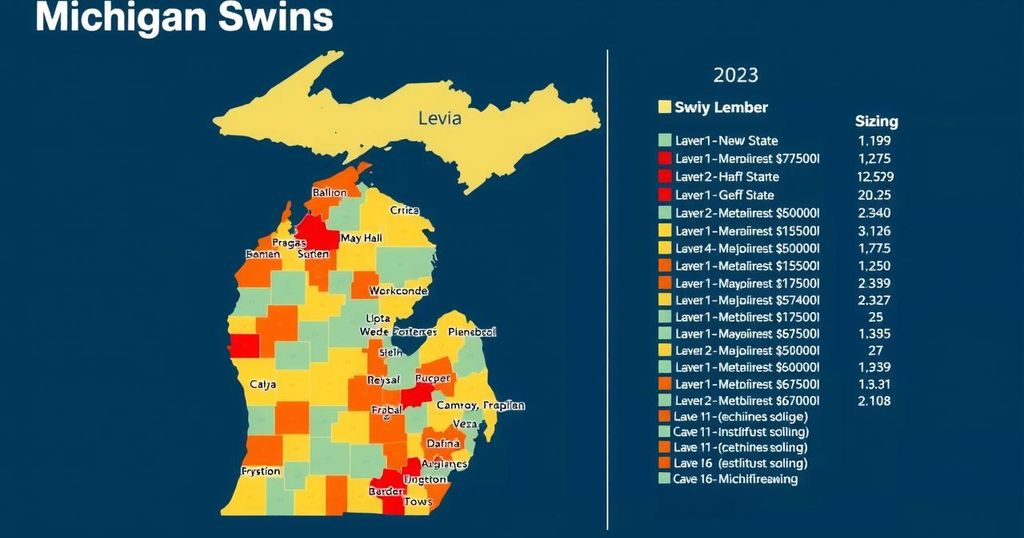Michigan’s Crucial Role in the 2024 Presidential Election

Michigan is a key swing state with a population of 10.03 million and 15 electoral votes that has seen fluctuating political allegiance in recent elections. Joe Biden won Michigan in 2020 after it was a Trump stronghold in 2016. Candidates are focusing on local industries, economic concerns, and diverse voter needs as the 2024 election approaches, with particular attention given to swing voters discontent with inflation.
Michigan, known for its notable Great Lakes, the iconic Ford Mustang, and pop superstar Madonna, stands as one of the pivotal swing states that will influence the outcome of the 2024 United States presidential election. The state’s unpredictable voting tendencies, which can sway between Democratic and Republican candidates, have garnered significant attention as the election approaches. The demographics reveal that Michigan boasts a population of approximately 10.03 million, comparable to that of Greece. It holds 15 electoral votes out of a total of 538, making it a crucial battleground in presidential elections. Historically, Michigan was a key contributor to Donald Trump’s victory in 2016 but saw a reversal with Joe Biden securing the state in 2020, winning by a margin of 150,000 votes. As the 2024 election year progresses, neither Vice President Kamala Harris nor President Biden is underestimating the importance of Michigan. Their campaign strategies are focused on the state’s significant automotive industry, addressing national concerns such as economic stability and immigration policies that resonate with the electorate. Michigan’s electorate is diverse, spanning from the Democratic bastion of Detroit to numerous rural areas that traditionally lean Republican. Reflecting broader national sentiments, Michigan voters express apprehension over the escalating cost of living. One voter, Darrell Sumpter, 52, who supported Trump previously, expressed his financial struggles, stating, “I have never been able to even afford a house. I have been waiting for years.” The automotive industry, centered in Detroit, remains a critical focal point for many voters within the surrounding regions. Additionally, given that Michigan is home to the largest Arab-American population in the nation, international issues, such as the ongoing war in the Middle East, are particularly impactful. Political analysts indicate that the Democratic party is concentrating efforts on consolidating support within key left-leaning counties such as Oakland, Washtenaw, and Wayne. Conversely, the Trump campaign is attempting to regain footing in swing areas like Macomb County by appealing to voters in rural communities. Furthermore, Democrats are aiming to reconnect with constituencies that shifted their allegiance to Trump in the previous election cycle. Matt Grossmann, a political science professor at Michigan State University, notes, “White, non-college voters, manual workers… have been moving towards Republicans.” Both major parties are particularly attentive to Michigan’s swing voters, a demographic marked by frustration over inflation, typically consisting of lower middle-class or working-class individuals who do not continuously engage with political developments.
The state of Michigan has consistently played a key role in national elections due to its status as a swing state, where the political allegiance of voters can shift significantly between elections. In the context of the 2024 presidential race, the state’s economic landscape, particularly its automotive industry, and demographic diversity, including urban and rural divides, add complexity to the electoral situation. Voter sentiment, shaped by local and national events, as well as individual socioeconomic conditions, informs the strategies of candidates as they seek to address the unique concerns of Michigan’s electorate.
In summary, Michigan’s electoral significance in the 2024 presidential election cannot be overstated. With a fragmented but dynamic voter base influenced by economic conditions and national issues, candidates must strategically engage with a diverse demographic. The outcome will depend on their ability to resonate with swing voters, particularly those disillusioned by rising living costs while navigating the historical shifts in voter loyalty witnessed in recent elections.
Original Source: www.bbc.com







